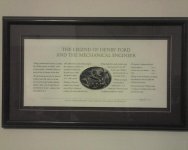Added pic
I am not an instructor, but an avid student of the game (pool, snooker and carom). My reason for emulating pros is that their style has evolved through long times of trial and error and is adapted to the current playing conditions. Some books were written when slow cloths were more prevalent and also more generous pockets. I play both pool and snooker, but snooker and pool are different. Pool have more power shots than snooker and the balls are heavier. I believe that the pros strokes and bridge lengths are a result of those differences. While you can play pool at an extremely high level using a fixed elbow, short bridge and little english, I believe there is a reason why top pros do not play the game this way. You may fault my reasoning all you want.
Straightpool_99:
I perfectly understand your reasoning. But, there's a difference between a player that knows what to do and why (as our friend John Brumback does), and an instructor that knows how to diagnose root-level causes and how to fix them.
Have you ever read "The Legend of Henry Ford and the Mechanical Engineer"? It goes like this:
Henry's production line had come to a grinding halt. The in-house engineers were baffled -- unable to solve the problem. Meanwhile, Henry was aware each hour of downtime cost him dearly.
It soon became apparent he had no choice but to bring in outside help. And so a call went out to one of the country's leading mechanical engineers. Upon arrival, he walked from one end of the line to the other... stopping to listen every twenty feet or so.
He walked back to a point midway along the line. Focusing his attention on a metal plate, he withdrew from his pocket a piece of chalk with which he chalked an "X"... with a flourish.
Turning to Henry he remarked, "remove that plate and you'll find a broken gear assembly." Just what it turned out to be.
Henry thanked the outsider profusely, saying, "send me your bill, it's one I'll be glad to pay." Which is what the outsider did -- in the ammount of $500.00.
Henry was outraged and demanded an itemized invoice -- or he wouldn't pay. Several days later an envelope was delivered to Henry.
It contained a statement which read:
Chalk for chalkmark .................................................. $000.25
Knowing where to place chalkmark ..................................... $499.75
Total .................................................. ..............$500.00
Seeing the truth of the matter and realizing this individual was not to be trifled with, Henry paid the invoice.
The moral of the story? When it comes to making new technology work, it's what you know that counts.
121/500
What does this have to do with this thread? The fact is, an instructor is a "consultant" (the mechanical engineer, in this context), and not only knows how all the working parts work, but also what to look for when the machinery doesn't perform its job. The consultant (instructor) is much, *MUCH* better at this than even the shop foreman or the guys that are working that production line (the pro player, in this context).
While I do think that our friend John Brumback is much more akin to a consultant (precisely because he's been teaching on the side for a while, and has the seasoning of what to look for), you'll find that most pro players make
lousy instructors. Sure, they'll be able to tell you what they do and why you should do it, but they can't tell you why it works, or they give you some cockamamy explanation. And, they won't be able to point out why your fundamentals/stance/cueing action is flawed; they'll just say "you need to do it like this" -- without any account as to the different body types and anatomical idiosyncracies people have. Yet, the average pool player so desperately wanting to get better gravitate to those with *ability* rather than those with knowledge.
In my field (information technology), you have those who just gravitate to those with ability, and ultimately find themselves in a career that consists of nothing more than doing maintenance or system administration. Then, you have those who gravitate to those with knowledge, and find themselves climbing higher on the ladder because they're equipped with the knowledge that grows and feeds into itself.
It's like the old adage about giving a man a fish or teaching him to fish.
-Sean
John B.
